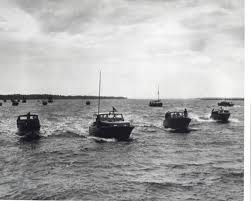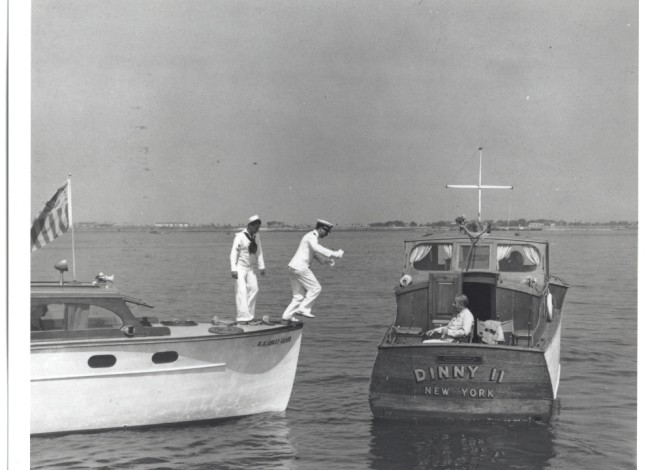Auxiliary History
The United States Coast Guard Auxiliary
An Integral Part of America's Coast Guard Forces
By Thomas F. Kehr, Flotilla Staff Officer, USCGAUX Flotilla 1NR28
August 4, 2005 will mark the 215th anniversary of the founding of the United States Revenue Marine, the service that became today’s United States Coast Guard. From its inception, the Coast Guard has been different in kind from the rest of America’s armed services. Apart from its military functions, the Coast Guard is also tasked with a broad range of additional duties: search and rescue at sea; administration of the nation’s maritime laws; environmental protection; port security; and maintenance of the nation’s public aids to navigation, to name but a few. This small service also has a tradition of making efficient and creative use of the resources at its disposal. Nowhere is this more apparent than in its establishment of the United States Coast Guard Auxiliary, a unique entity that has been quietly serving the nation for the past sixty-six years (pictures below courtesy of http://history.auxpa.org/index.html).


If you have encountered the Auxiliary on the waters of New Hampshire’s seacoast or attended one of its boating classes, you, like many, may be uncertain of just how that group fits into the structure of the service as a whole. The United States Coast Guard Auxiliary is decidedly not a private club formed simply to lend moral support to the Coast Guard. Rather, its personnel are full members of America’s Coast Guard Forces who volunteer to put their time – and in some cases their vessels – at the service of the United States. Members undergo initial testing and security screening before earning the right to wear the uniform of the United States Coast Guard (distinguished from that of the regular and reserve service by silver accoutrements and the letter "A" on insignia). Their vessels, flying the "Auxiliary Patrol Boat Ensign," are often under federal orders - and when so engaged have the status of ships of the United States government. As uniformed civilian members of the Coast Guard, auxiliarists do not receive compensation for their time, nor are they entitled to military leave for the service they perform. They are truly volunteers – heirs to the spirit of the 18th century minuteman units that were America’s original guardians.
The Auxiliary was born of pressing need and the extraordinarily diverse nature of the Coast Guard’s responsibilities. As the dark clouds of World War Two began to gather over America’s thousands of miles of coastline, the Commandant of the Coast Guard recognized that his service was the only one of America’s military forces without a reserve component. He reasoned that this gap could be filled by the creation of small flotillas of private vessels available to respond to maritime emergencies and assist in the Coast Guard’s other non-military functions. Warily, a non-military U.S. Coast Guard Reserve was established.
Within a year, the war in Europe demonstrated the invaluable service that could be rendered by civilian sailors operating in the national interest. In May and June of 1940, the army of the Third Reich swept through France in a matter of six weeks, pushing the remnants of the British Expeditionary Forces and allied armies (338,000 men) to the English Channel. At Dunkirk, the stranded Army, unable to escape across the water to the safety of the British Isles, awaited certain annihilation. In a stunning display of altruistic seamen’s courage, however, over 1,000 British civilian boaters swiftly gathered a formidable flotilla of small craft to assist the overtaxed Royal Navy and Merchant Marine, crossed the English Channel and rescued the stranded Army.
The United States Coast Guard took heed of the "Miracle of Dunkirk" and swiftly reorganized its reserve force. Less than a year before the Japanese attack on Pearl Harbor, a Coast Guard military reserve was established. The original civilian reserve was redesignated as the "United States Coast Guard Auxiliary" and, as German U-boats threatened the Atlantic coastline, a call was issued for yachts and motorboats, with crew, to volunteer for service as coastal patrol vessels. Like their forebears, the citizens of New England (the birthplace of the Coast Guard) responded in force.During the Second World War, the substantial responsibility of patrolling the Atlantic and Pacific coastline and assisting in search and rescue missions fell in part to the Auxiliary. The need was such that in 1942 Congress took the unprecedented step of creating a "Coast Guard Temporary Reserve" ("TR") comprised of Auxiliary officers and crew deemed suitable for special duty. As do auxiliarists today, members of the "TR" performed part-time service alongside the regular Coast Guard. Unlike their "gold side" counterparts, they normally retained their unpaid volunteer status. The auxiliarists of the "TR" and Auxiliary spent tens of thousands of hours standing watches, assisting in port security and locating and reporting on the positions of German submarines in the North Atlantic. Some auxiliarists volunteered to stray further from home. When General Douglas MacArthur could not secure vessels and sailors from the Navy to conduct island landings in the Pacific, auxiliarists were recruited to fill the need, some serving as the nucleus of the United States Army Transportation Corps Water Transport Division’s Small Boat Branch.
Since the Second World War and the disbanding of the Temporary Reserve (a unique organization still authorized by federal law), the volunteer Auxiliary has steadfastly performed its assigned duties as an integral component of the modern Coast Guard (now part of the Department of Homeland Security). The members of New Hampshire’s two Auxiliary flotillas – both headquartered at Coast Guard Station Portsmouth Harbor in New Castle – are doctors, lawyers, law enforcement and fire personnel, tradesmen, laborers and members (or retired members) of many other occupations. They cover all age groups. All are committed to the purposes of the modern Auxiliary as set forth in federal statutes and regulations (14 USC 822; 33 CFR § 5.03):
- To promote safety and effect rescues on and over the high seas and navigable waters;
- To promote efficiency in the operation of motorboats and yachts and foster a wider knowledge of, and better compliance with, the laws, rules and regulations governing the operation of those vessels; and
- To assist the Coast Guard as authorized by the Commandant, in performing any Coast Guard function, power, duty, role, mission or operation authorized by law.
Today’s Auxiliary is engaged in all Coast Guard functions, with the exception of military and direct law enforcement missions assigned to the active or reserve forces. The amount of time a member chooses to devote to service is dictated by the individual him or herself and depends upon the programs in which the auxiliarist chooses to be involved. Those programs include, but are not limited to, on-the-water operations; marine safety, security and environmental protection; and recreational boating safety, including the provision of vessel safety checks and boating education classes. Given the varied nature of these programs and the need to man Auxiliary vessels with crew, vessel ownership is no longer a prerequisite to Auxiliary service. Training is substantial but, like almost all aspects of Auxiliary membership, voluntary. In terms of organization, the Auxiliary remains substantially and surprisingly democratic. Like officers of the old militia, flotilla commanders, vice commanders, division captains, and even the Auxiliary National Commodore are elected to office by members of their unit.
As the Coast Guard flag flies over the State House in Concord this August 4, New Hampshire’s Auxiliary flotillas stand ready to address the demands of the 21st century with pride in their past and commitment to the demands of the future. They are, with America’s Coast Guard Forces as a whole, "Semper Paratus" – "Always Prepared."